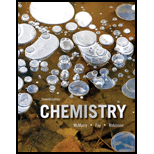
Used in welding metals, the reaction of acetylene with oxygen has
How much PV work is done in kilojoules and what is the value of
Want to see the full answer?
Check out a sample textbook solution
Chapter 9 Solutions
Chemistry (7th Edition)
- 9.53 Using these reactions, find the standard enthalpy change for the formation of 1 mol of PhO(s) from lead metal and oxygen gas. PbO(s)+C(graphite)Pb(s)+CO(g) H = 106.8 kJ 2C(graphite)+O2(g)2CO(g) H= -221.0 kJ If 250 g of lead reacts with oxygen to form lead(II) oxide, what quantity of thermal energy (in kJ) is ahsorhed or evolved?arrow_forwardWhen solid iron burns in oxygen gas (at constant pressure) to produce Fe2O3(s), 1651 kJ of heat is released for every 4 mol of iron burned. How much heat is released when 10.3 g Fe2O3(s) is produced (at constant pressure)? What additional information would you need to calculate the heat released to produce this much Fe2O3(s) if you burned iron in ozone gas, O3(g), instead of O2(g)?arrow_forwardShown below is a diagram depicting the enthalpy change of a chemical reaction run at constant pressure. a Is the reaction exothermic or endothermic? b What is the sign of H? c What is the sign of q? d If the reaction does no work, what is the sign of E for this process?arrow_forward
- Another reaction that is used to propel rockets is N2O4(l)+2N2H4(l)3N2(g)+4H2O(g) This reaction has the advantage that neither product is toxic, so no dangerous pollution is released. When the reaction consumes 10.0 g liquid N2O4, it releases 124 kJ of heat. (a) Is the sign of the enthalpy change positive or negative? (b) What is the value of H for the chemical equation if it is understood to be written in molar quantities?arrow_forwardNiagara Falls has a height of 167 ft (American Falls). What is the potential energy in joules of 1.00 lb of water at the top of the falls if we take water at the bottom to have a potential energy of zero? What would be the speed of this water at the bottom of the falls if we neglect friction during the descent of the water?arrow_forwardAssume 200. mL of 0.400 M HCl is mixed with 200. mL of 0.400 M NaOH in a coffee-cup calorimeter The temperature of the solutions before mixing was 25.10 C; after mixing and allowing the reaction to occur, the temperature is 27.78 C. What is the enthalpy change when one mole of acid is neutralized? (Assume that the densities of all solutions are 1.00 g/mL and their specific heat capacities are 4.20 J/g K.)arrow_forward
- Gasohol, a mixture of gasoline and ethanol, C2H5OH, is used as automobile fuel. The alcohol releases energy in a combustion reaction with O2. C2H5OH(l)+3O2(g)2CO2(g)+3H2O(l) If 0.115 g ethanol evolves 3.62 kJ when burned at constant pressure, calculate the combustion enthalpy for ethanol.arrow_forwardThe Romans used calcium oxide, CaO, to produce a strong mortar to build stone structures. Calcium oxide was mixed with water to give Ca(OH)2, which reacted slowly with CO2 in the air to give CaCO3. Ca(OH)2(s) + CO2(g) CaCO3(s) + H2O(g) (a) Calculate the standard enthalpy change for this reaction. (b) How much energy is evolved or absorbed as heat if 1.00 kg of Ca(OH)2 reacts with a stoichiometric amount of CO2?arrow_forwardA 50-mL solution of a dilute AgNO3 solution is added to 100 mL of a base solution in a coffee-cup calorimeter. As Ag2O(s) precipitates, the temperature of the solution increases from 23.78 C to 25.19 C. Assuming that the mixture has the same specific heat as water and a mass of 150 g, calculate the heat q. Is the precipitation reaction exothermic or endothermic?arrow_forward
- 9.41 Under what conditions does the enthalpy change equal the heat of a process?arrow_forwardA 0.470-g sample of magnesium reacts with 200 g dilute HCl in a coffee-cup calorimeter to form MgCl2(aq) and H2(g). The temperature increases by 10.9 C as the magnesium reacts. Assume that the mixture has the same specific heat as water and a mass of 200 g. (a) Calculate the enthalpy change for the reaction. Is the process exothermic or endothermic? (b) Write the chemical equation and evaluate H.arrow_forwardWhen lightning strikes, the energy can force atmospheric nitrogen and oxygen to react to make NO: N2(g)+O2(g)2NO(g)H=+181.8kJ (a) Is this reaction endothermic or exothermic? (b) What quantities of reactants and products are assumed if H = +181.8 kJ? (c) What is the enthalpy change when 3.50 g nitrogen is reacted with excess O2(g)?arrow_forward
 Chemistry & Chemical ReactivityChemistryISBN:9781133949640Author:John C. Kotz, Paul M. Treichel, John Townsend, David TreichelPublisher:Cengage Learning
Chemistry & Chemical ReactivityChemistryISBN:9781133949640Author:John C. Kotz, Paul M. Treichel, John Townsend, David TreichelPublisher:Cengage Learning Chemistry & Chemical ReactivityChemistryISBN:9781337399074Author:John C. Kotz, Paul M. Treichel, John Townsend, David TreichelPublisher:Cengage Learning
Chemistry & Chemical ReactivityChemistryISBN:9781337399074Author:John C. Kotz, Paul M. Treichel, John Townsend, David TreichelPublisher:Cengage Learning General Chemistry - Standalone book (MindTap Cour...ChemistryISBN:9781305580343Author:Steven D. Gammon, Ebbing, Darrell Ebbing, Steven D., Darrell; Gammon, Darrell Ebbing; Steven D. Gammon, Darrell D.; Gammon, Ebbing; Steven D. Gammon; DarrellPublisher:Cengage Learning
General Chemistry - Standalone book (MindTap Cour...ChemistryISBN:9781305580343Author:Steven D. Gammon, Ebbing, Darrell Ebbing, Steven D., Darrell; Gammon, Darrell Ebbing; Steven D. Gammon, Darrell D.; Gammon, Ebbing; Steven D. Gammon; DarrellPublisher:Cengage Learning Chemistry: The Molecular ScienceChemistryISBN:9781285199047Author:John W. Moore, Conrad L. StanitskiPublisher:Cengage Learning
Chemistry: The Molecular ScienceChemistryISBN:9781285199047Author:John W. Moore, Conrad L. StanitskiPublisher:Cengage Learning Chemistry: Principles and PracticeChemistryISBN:9780534420123Author:Daniel L. Reger, Scott R. Goode, David W. Ball, Edward MercerPublisher:Cengage Learning
Chemistry: Principles and PracticeChemistryISBN:9780534420123Author:Daniel L. Reger, Scott R. Goode, David W. Ball, Edward MercerPublisher:Cengage Learning Chemistry: Principles and ReactionsChemistryISBN:9781305079373Author:William L. Masterton, Cecile N. HurleyPublisher:Cengage Learning
Chemistry: Principles and ReactionsChemistryISBN:9781305079373Author:William L. Masterton, Cecile N. HurleyPublisher:Cengage Learning





